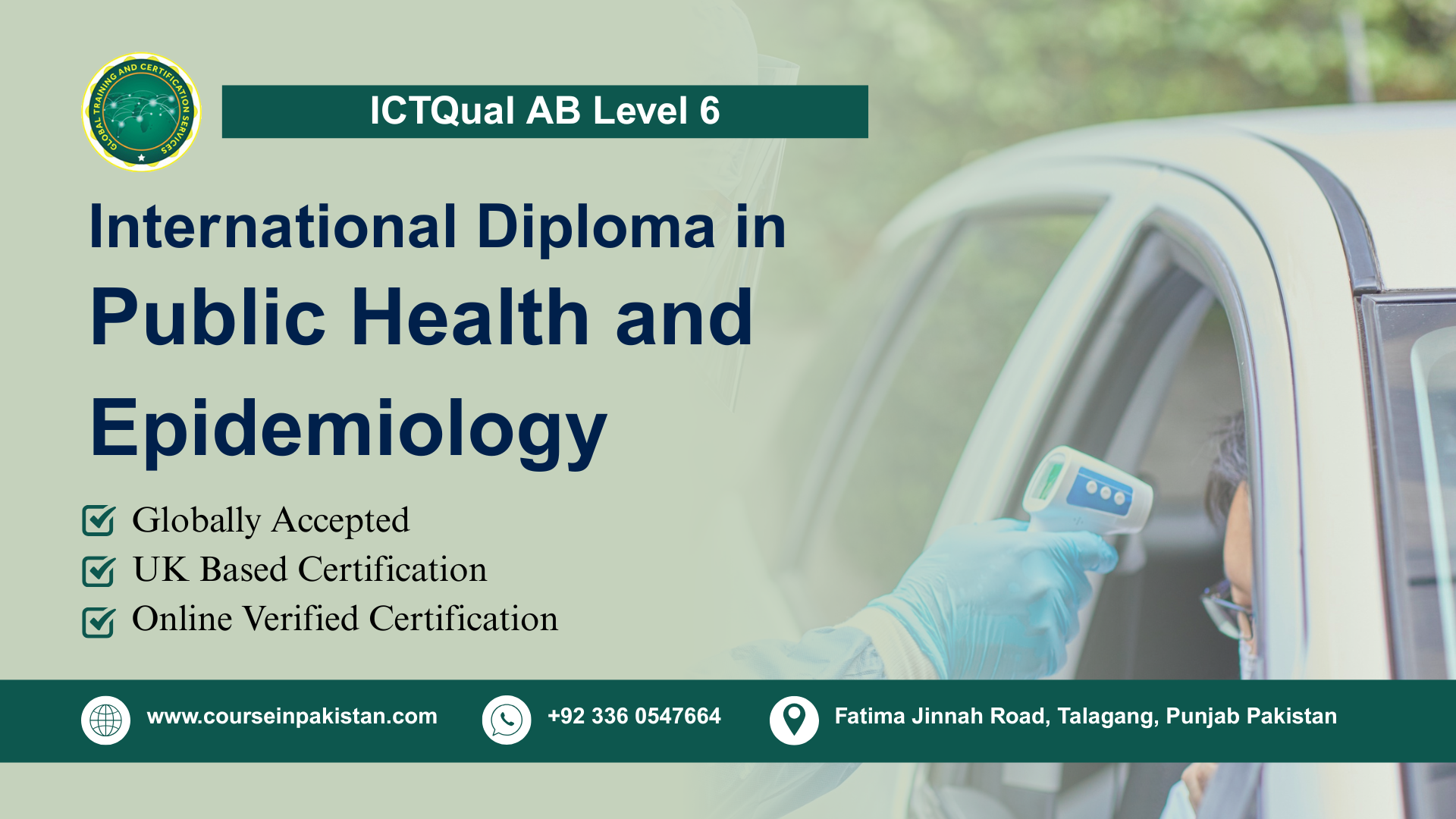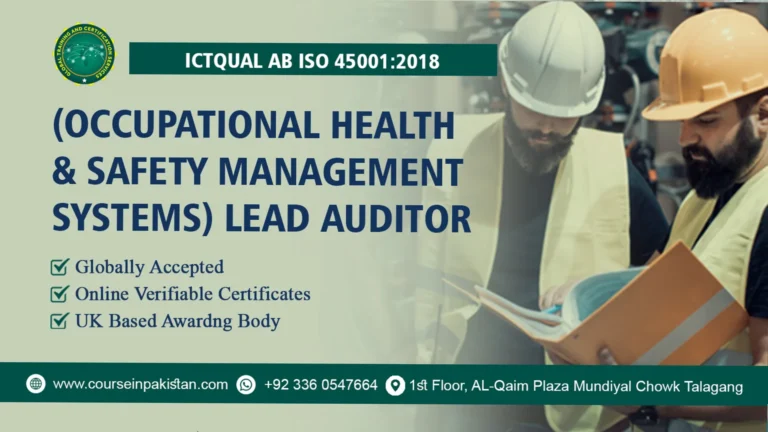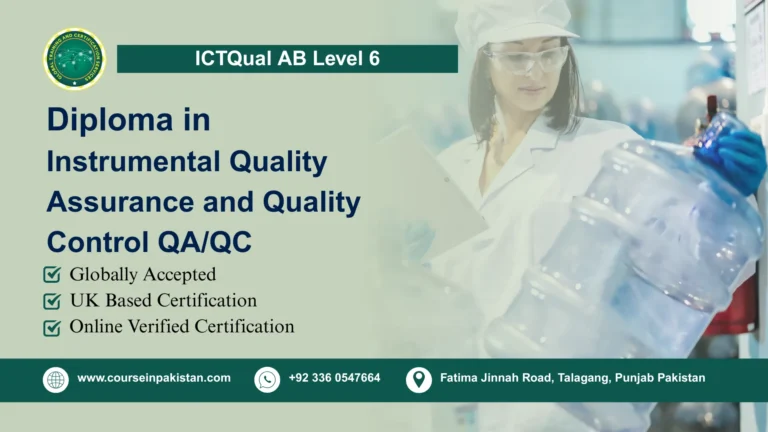
The ICTQual AB Level 6 International Diploma in Public Health and Epidemiology is a globally recognized program designed to provide learners with advanced knowledge and practical skills in public health, epidemiology, and population health management. This course covers essential topics such as disease prevention, health promotion, epidemiological research, biostatistics, health policy, and community health interventions. Learners will develop expertise in designing, implementing, and evaluating public health programs, preparing them for impactful careers in hospitals, research institutions, NGOs, government agencies, and global health organizations.
This qualification is ideal for both fresh students and experienced professionals. Fresh learners will complete all 36 mandatory assignments over three years, gaining comprehensive theoretical knowledge alongside practical skills. Experienced professionals can fast-track their certification by submitting verifiable six years of relevant experience and demonstrating their expertise in professional discussion meetings with an ICTQual AB approved assessor, enabling them to complete the diploma in a shorter time without completing all mandatory assignments.
Course Overview
The ICTQual AB Level 6 International Diploma in Public Health and Epidemiology is a 360-credit, fully assignment-based qualification that allows learners to study at their own pace from anywhere in the world. This internationally recognized certification is British Council verifiable, MOFA and Embassy attestable, making it highly suitable for job opportunities and Iqama approval. The program is designed to equip learners with advanced knowledge and practical skills in epidemiology, public health research, disease prevention, health policy, and community health interventions.
Fresh students are required to complete all 36 mandatory assignments within three years, gaining comprehensive understanding and practical expertise in public health principles, statistical analysis, epidemiological methods, and health program implementation. Experienced professionals can pursue this certification by submitting verifiable six years of relevant experience and demonstrating their knowledge through professional discussion meetings with an ICTQual AB approved assessor, enabling them to achieve the qualification in a shorter period without completing all assignments. This flexible approach ensures accessibility for learners at all stages while providing an internationally recognized credential that enhances career prospects, professional credibility, and opportunities in public health and epidemiology globally.
Key Highlights of the Course:
- 360-credit, fully assignment-based international diploma for self-paced learning
- British Council verifiable, MOFA and Embassy attestable certification suitable for jobs and Iqama approval
- Comprehensive coverage of public health, epidemiology, biostatistics, health policy, and community interventions
- Flexible pathways for fresh students (36 assignments) and experienced professionals (shortened route via professional discussion)
- Focus on practical, evidence-based skills and research for global public health impact
Course Benefits
1. Career Advancement
- Access to specialist roles in public health, epidemiology, health policy, and research institutions
- Opportunities in hospitals, NGOs, government agencies, and international health organizations
2. Flexible Learning
- Self-paced, fully assignment-based learning from anywhere in the world
- Shortened certification pathway for experienced professionals with verifiable experience
3. Practical and Research Skills
- Develop skills in data analysis, epidemiology, public health program design, and evaluation
- Apply evidence-based practices in real-world community and healthcare settings
4. International Recognition
- British Council verifiable, MOFA and Embassy attestable certification
- Enhances employability, credibility, and professional growth in public health
5. Professional Development
- Strengthen leadership, communication, and project management skills
- Prepare for higher studies, consultancy roles, or senior positions in public health and epidemiology
Course Study Units
This qualification, the ICTQual AB Level 6 International Diploma in Public Health & Epidemiology 360 Credits – Three Years, consists of 36 mandatory units.
Year 1: Foundation in Public Health & Epidemiology
- Introduction to Public Health
- Fundamentals of Epidemiology
- Human Anatomy and Physiology for Public Health
- Biostatistics and Health Data Analysis
- Principles of Microbiology and Infection Control
- Health Promotion and Disease Prevention
- Nutrition and Community Health
- Environmental Health and Sustainability
- Health Policy and Systems Overview
- Communication Skills for Health Professionals
- Ethics and Professional Conduct in Public Health
- Introduction to Research Methods in Health Sciences
Year 2: Intermediate Public Health Applications
- Advanced Epidemiology and Study Design
- Infectious Disease Control and Prevention
- Non-Communicable Diseases and Chronic Care Management
- Global Health Issues and Health Systems
- Health Economics and Policy Implementation
- Public Health Surveillance and Monitoring
- Occupational and Environmental Health
- Community Health Assessment and Planning
- Health Informatics and Digital Health Systems
- Programme Evaluation and Impact Assessment
- Leadership and Teamwork in Public Health
- Applied Research Methods in Epidemiology
Year 3: Advanced Specialisation and Professional Application
- Advanced Public Health Interventions
- Clinical Epidemiology and Evidence-Based Practice
- Health Risk Assessment and Management
- Biostatistics for Advanced Research
- Global Health Policy and Strategy Development
- Emergency Preparedness and Disaster Management
- Maternal and Child Health Epidemiology
- Advanced Communicable Disease Control
- Health Communication and Advocacy
- Quality Improvement and Risk Management in Healthcare
- Capstone Research Project / Dissertation
- Professional Practice and Field Placement
Learning Outcomes
Year 1 – Foundation in Public Health & Epidemiology
1. Introduction to Public Health
- Understand core concepts and principles of public health
- Explain the role of public health in improving population health
- Identify key public health organizations and initiatives
2. Fundamentals of Epidemiology
- Describe the principles of disease distribution and determinants
- Apply basic epidemiological methods to analyze health data
- Interpret epidemiological studies to inform health policy
3. Human Anatomy and Physiology for Public Health
- Understand the structure and function of human body systems
- Relate physiological principles to public health practice
- Apply knowledge to disease prevention and health promotion strategies
4. Biostatistics and Health Data Analysis
- Use statistical methods to analyze public health data
- Interpret results to support evidence-based decision making
- Apply biostatistical techniques in health research and program evaluation
5. Principles of Microbiology and Infection Control
- Identify microorganisms and their impact on human health
- Apply infection prevention and control measures
- Analyze strategies to reduce the spread of infectious diseases
6. Health Promotion and Disease Prevention
- Design health promotion strategies for diverse populations
- Implement preventive interventions for common diseases
- Evaluate the effectiveness of health promotion programs
7. Nutrition and Community Health
- Assess nutritional needs and their impact on community health
- Develop programs to improve diet and wellbeing in populations
- Apply nutritional knowledge to public health interventions
8. Environmental Health and Sustainability
- Understand environmental factors affecting health
- Analyze the impact of pollution, waste, and sustainability practices
- Propose solutions for healthier and sustainable communities
9. Health Policy and Systems Overview
- Understand health system structures and policies
- Analyze the impact of policy decisions on population health
- Evaluate health system performance and outcomes
10. Communication Skills for Health Professionals
- Demonstrate effective communication with communities and stakeholders
- Prepare reports, presentations, and health education materials
- Apply interpersonal and professional communication in public health settings
11. Ethics and Professional Conduct in Public Health
- Understand ethical principles in public health practice
- Apply ethical reasoning to professional decision-making
- Evaluate dilemmas and responsibilities in healthcare contexts
12. Introduction to Research Methods in Health Sciences
- Understand basic research designs and methodologies
- Collect, analyze, and interpret health data accurately
- Apply evidence-based practice to public health challenges
Year 2 – Intermediate Public Health Applications
13. Advanced Epidemiology and Study Design
- Design and conduct advanced epidemiological studies
- Apply statistical and analytical methods for population health research
- Interpret complex epidemiological data to guide interventions
14. Infectious Disease Control and Prevention
- Implement strategies to control infectious diseases
- Analyze patterns of disease transmission and outbreaks
- Develop evidence-based prevention programs
15. Non-Communicable Diseases and Chronic Care Management
- Understand risk factors and management of chronic diseases
- Design public health interventions for non-communicable diseases
- Evaluate effectiveness of prevention and management programs
16. Global Health Issues and Health Systems
- Assess global health challenges and disparities
- Analyze health systems and their impact on population health
- Develop strategies to address global health priorities
17. Health Economics and Policy Implementation
- Apply economic principles to healthcare planning and policy
- Evaluate cost-effectiveness and resource allocation in public health
- Analyze policy implementation strategies and outcomes
18. Public Health Surveillance and Monitoring
- Develop surveillance systems for health monitoring
- Analyze health data trends to detect emerging threats
- Apply monitoring strategies to inform public health decisions
19. Occupational and Environmental Health
- Identify workplace and environmental hazards
- Implement occupational health and safety measures
- Evaluate interventions to protect worker and community health
20. Community Health Assessment and Planning
- Conduct community health needs assessments
- Develop strategic plans to improve community health
- Monitor and evaluate the impact of community interventions
21. Health Informatics and Digital Health Systems
- Use digital tools for public health data management
- Apply health informatics to improve patient care and population health
- Analyze and interpret digital health data for decision making
22. Programme Evaluation and Impact Assessment
- Design and implement program evaluations
- Analyze outcomes to assess public health impact
- Recommend improvements based on evaluation findings
23. Leadership and Teamwork in Public Health
- Demonstrate leadership skills in public health settings
- Work effectively in multidisciplinary teams
- Apply project management principles to health initiatives
24. Applied Research Methods in Epidemiology
- Design research projects addressing epidemiological questions
- Collect and analyze data for population health studies
- Apply research findings to inform public health interventions
Year 3 – Advanced Specialisation and Professional Application
25. Advanced Public Health Interventions
- Design and implement complex public health programs
- Evaluate intervention effectiveness in diverse populations
- Apply evidence-based approaches to improve population health outcomes
26. Clinical Epidemiology and Evidence-Based Practice
- Apply epidemiological principles to clinical and public health settings
- Integrate research evidence into healthcare decision-making
- Evaluate clinical outcomes using epidemiological methods
27. Health Risk Assessment and Management
- Conduct risk assessments for communities and organizations
- Develop strategies to mitigate health risks
- Evaluate the effectiveness of risk management interventions
28. Biostatistics for Advanced Research
- Apply advanced statistical techniques to health research
- Interpret complex datasets to guide public health decisions
- Use statistical software and methods for research analysis
29. Global Health Policy and Strategy Development
- Analyze global health policies and frameworks
- Develop strategies for addressing international health challenges
- Evaluate policy effectiveness and propose improvements
30. Emergency Preparedness and Disaster Management
- Develop plans for public health emergency response
- Implement disaster management and mitigation strategies
- Evaluate the effectiveness of emergency preparedness initiatives
31. Maternal and Child Health Epidemiology
- Assess health needs and outcomes for mothers and children
- Design public health programs to improve maternal and child health
- Analyze data to inform interventions and policies
32. Advanced Communicable Disease Control
- Plan and implement control measures for infectious diseases
- Monitor and evaluate disease prevention programs
- Apply outbreak investigation methods in public health practice
33. Health Communication and Advocacy
- Develop strategies for effective health communication
- Advocate for public health policies and programs
- Engage communities to improve health outcomes
34. Quality Improvement and Risk Management in Healthcare
- Implement quality improvement initiatives in health systems
- Assess and mitigate risks in healthcare delivery
- Monitor and evaluate improvement interventions for effectiveness
35. Capstone Research Project / Dissertation
- Conduct independent research addressing a real-world public health issue
- Apply research design, methodology, and analytical skills
- Present findings in a professional report or scientific format
36. Professional Practice and Field Placement
- Demonstrate practical competence in public health and epidemiology
- Apply theoretical knowledge in field-based settings
- Reflect on professional growth and integrate feedback for continuous improvement
Who is This Course For?
The ideal learner for this course is someone who:
- Has a keen interest in public health, epidemiology, and community health improvement
- Wants to develop expertise in disease prevention, health promotion, and health systems
- Is motivated to work in healthcare, government agencies, NGOs, or global health organizations
- Can manage self-paced, assignment-based learning from anywhere in the world
- Seeks to apply evidence-based practices, research skills, and advanced data analysis in real-world health settings
Future Progression
Graduates of this diploma can pursue:
- Specialist roles in epidemiology, public health management, health policy, and global health programs
- Leadership or advisory positions in hospitals, governmental health agencies, NGOs, or international organizations
- Opportunities in health research, disease prevention programs, and emergency preparedness initiatives
- Consultancy or project management roles in public health interventions and community health programs
- Advanced studies including Master’s or research-based degrees in Public Health, Epidemiology, or Health Management
Academic Pathways:
- Learners completing this diploma may continue to:
- Master’s programs in Public Health, Epidemiology, Global Health, or Health Policy
- Professional certifications in Disease Control, Health Management, or Epidemiology
- Postgraduate diplomas or short courses in Health Informatics, Biostatistics, or Emergency Preparedness
- Research-based programs or PhD studies focusing on global health, communicable disease control, or healthcare strategy
Conclusion
The ICTQual AB Level 6 International Diploma in Public Health & Epidemiology equips learners with comprehensive knowledge, practical skills, and professional expertise required for careers in public health and epidemiology. Graduates gain proficiency in epidemiological methods, disease prevention strategies, health policy, and community health interventions, enabling them to make a meaningful impact on population health. This internationally recognized, British Council verifiable, MOFA and Embassy attestable qualification enhances employability, provides flexible learning options for both fresh and experienced learners, and prepares professionals for leadership roles in public health globally.






